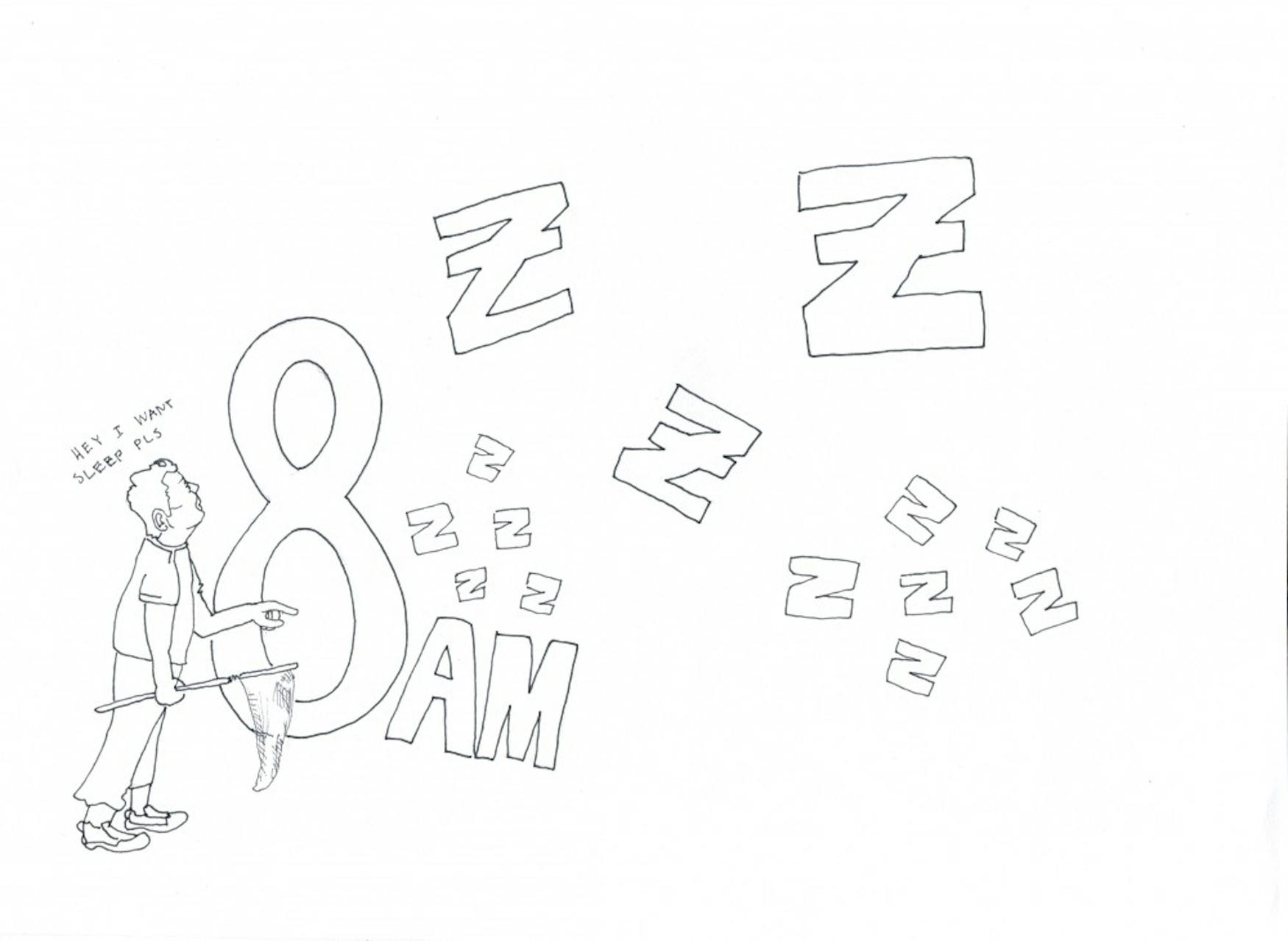Early school start times may be leaving students behind
College has a funny way of making you forget about high school. Case in point: Recently, while looking at our spring semester schedules, a friend of mine complained about the prospect of waking up for a morning class at 9 a.m.. What followed was a few of us from various states and school districts remembering how excruciatingly early we had to drag ourselves out of bed in high school.
To be fair, in my case, it wasn’t too excruciating. My high school had a rather reasonable start time of 8:10; moreover, since I lived close to my school, I could usually get away with waking up after 7:00 a.m. Others I spoke to were not so fortunate; the combination of pre-8 a.m. start times, combined with long bus rides, required them to wake up well before 6 a.m. Looking at the data, this isn’t all that unusual. 40 percent of public schools start before 8 a.m., according to an article in Scientific American. Factor in long bus rides and it becomes clear why 75 percent of teenagers get fewer than 8 hours of sleep on school nights, per a 2015 survey from the Center for Disease Control.
But it’s not as though the working world starts any later. One in five working adults wakes up before 5:30 a.m., and more than half are awake by 6:30 a.m., according to a nationally-conducted survey by Edison Research. But physiological differences in the brains of teenagers make waking up early harder than for adults. Adolescents’ circadian rhythms tend toward increased energy late at night and grogginess in the morning, according to the CDC. In fact, during adolescence, there is a biological shift in sleep schedules to a full 2 hours later, described by the Nationwide Children’s Hospital. According to the study, “A teenager who used to fall asleep at 9:00 p.m. will now not be able to fall asleep until 11:00 p.m.”
The combination of early school hours and an adolescent sleep schedule makes for an unsurprising result: Most teenagers aren’t getting enough sleep. In 2018, the American Academy of Sleep Medicine recommended all middle and high schools start after 8:30 a.m.; this is a goal that currently only 17 percent of public schools achieve, according to the CDC. While experts recommend teens get 8-10 hours a night, only 15 percent of teenagers slept at least 8.5f hours on school nights, reports the National Sleep Foundation.
Now, this might all seem a little obvious — “teenagers don’t like waking up early” is hardly breaking news. But even more interesting are the repeated studies displaying the many areas where students benefit when they wake up later, per the Washington Post. Some you’d expect: attention span increases and tardiness decreases. But there are other benefits, too — marked improvements in academic performance, mental and physical health, a reduction in teen vehicle accidents, behavioral issues and sleep disorders.
What’s more, students from economically disadvantaged backgrounds experienced the biggest drawbacks from early start times. The Hamilton Project at the Brookings Institute found that “early school start times reduce performance among disadvantaged students by an amount equivalent to having a highly ineffective teacher” in a 2011 paper. The science clearly supports one side of this debate, and it’s not the side that wants 16-year-olds to wake up at 5:30 a.m.
So — if all these findings are out there, why do high schools still start so early? The reasons are unclear. Two common arguments rest on having adequate time for after-school sports practice and the financial cost of shifting bus schedules. But, per the Washington Post, many districts have overcome the athletics issue “with flexibility on the part of the staff and coaches,” and while changing bus schedules can sometimes be costly, “this isn’t a certainty” — schools often overestimate the financial burden of these changes.
Another argument is that working parents’ schedules may not align with a later start time. But the current system is already inconvenient for them, as traditional school days “usually end a good two hours before the typical American workday does,” per a 2018 Atlantic article. And given that high schoolers are both far more autonomous than elementary schoolers, and would benefit more from later start times, shifting the schedules for older students more than for younger ones would minimize disruption to parents’ lives.
A more general reason: School systems are vast, complex entities that are slow to implement change. After all, as the Atlantic reports, many of our traditional school vacations originate in agricultural family's need to have their children home to help out during harvest time. School schedules are rooted in past traditions, and large-scale changes can be daunting, especially when making a mistake has the potential to affect so many people.
I believe there’s also a lack of action on this issue because of the attitude society has toward adolescents in general, and specifically beliefs surrounding teenage laziness and the character-building experience of rolling out of bed semi-conscious. As a society, we should try to base our policy-making on logic, rather than vague notions of the “benefits” of early rising.
On this front, there’s some good news — in recent years, some schools have decided to act. “Hundreds of schools in 44 states have jumped on the late-start bandwagon” in response to advocacy groups, per a 2017 Business Insider article. In fact, my district was one of them. My older sister remembers classes starting at 7:40, before start times were pushed back that precious half hour. Hopefully, this growing body of research will be enough to convince administrators to give the issue a closer look. Until then, one thing is clear: we should all be thankful for our 9 a.m. classes.



Please note All comments are eligible for publication in The Justice.